When Can a Puppy Sleep Through the Night Without Peeing? [Age]
Bringing a new puppy home comes with endless joy and, admittedly, some challenges, especially when it comes to nighttime routines. One common question puppy parents often ask is, “When can my puppy sleep through the night without needing to go potty?” So, let’s dive into this topic with some useful information to help ease your nighttime worries.
Generally, puppies build bladder control over time, and by the age of 6-7 months, most can sleep through the night without needing a bathroom break. However, be aware that this milestone may vary depending on your puppy’s breed and individual development. Smaller breeds have tinier bladders and may still require a potty break during the night.
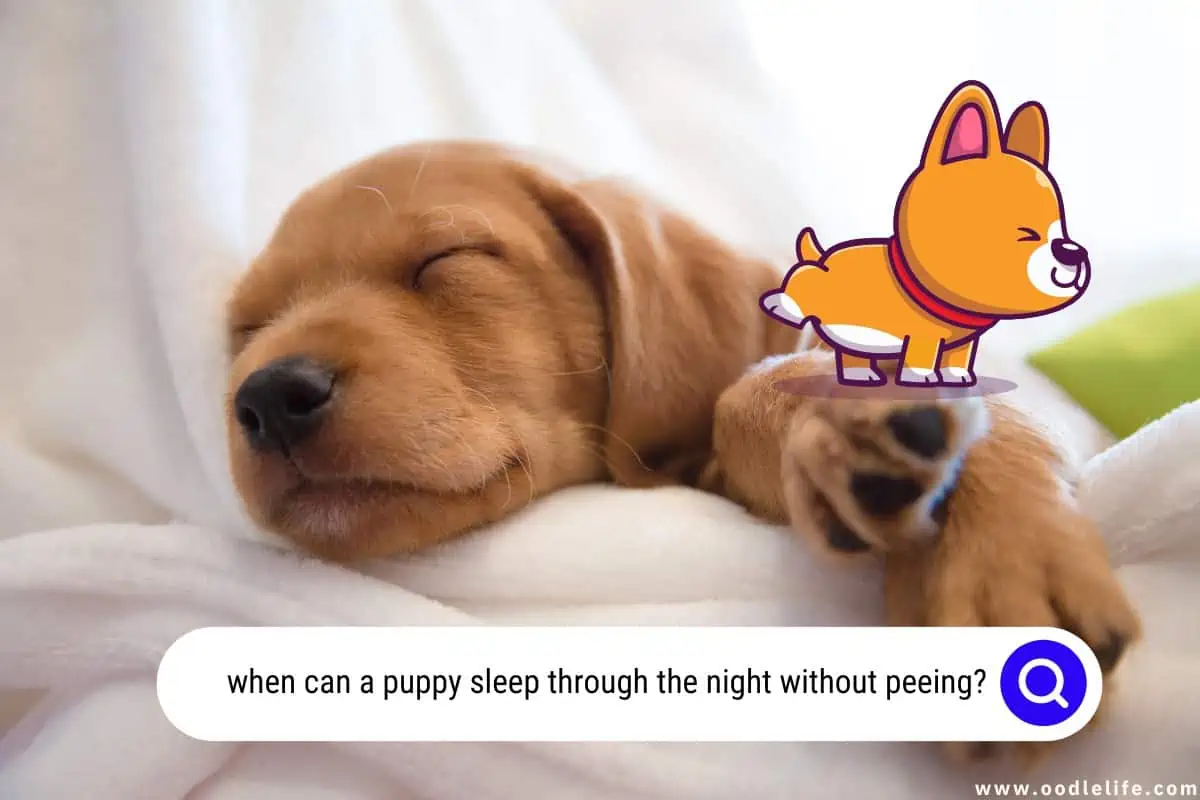
Remember, patience is key, and soon enough, you and your furry friend will enjoy uninterrupted sleep for longer periods.
Puppy Development and Sleeping Patterns
Puppy development plays a significant role in determining when a puppy can sleep through the night without needing to pee. Generally, by the time a puppy reaches 6-7 months of age, they may be able to sleep through the night without any accidents.

When a puppy is 8-10 weeks old, they may not be able to sleep through the night due to separation anxiety or the need for comfort. A typical sleeping routine for an 8-week-old puppy might involve a bedtime at 8 pm, nighttime toilet trips between 11 pm-12 am and 3 am-4 am, and waking up around 6 am. In addition, young puppies may take several daytime naps, totaling 4 to 8 hours.
To ease this process, you can establish a bedtime routine and use crate training techniques. Crate training provides a safe space for your puppy to sleep, and it can help them feel more secure during the night. Additionally, using a pheromone diffuser near their sleeping area can help soothe and reassure them, mimicking the comforting scent produced by their mother.
Remember, all puppies are unique, and their sleeping patterns may vary. Patience and consistency in training are essential to help your puppy gradually adapt to sleeping through the night without needing to pee.
Signs Your Puppy Is Ready to Sleep Through the Night
As a puppy grows and develops, there are key indicators that signify they’re ready to sleep through the night without needing a bathroom break. One of these signs is age: by 6 to 7 months old, most puppies should be able to hold their bladder throughout the night. This is supported by the fact that at 8-10 weeks old, puppies are usually capable of sleeping through the night without exhibiting signs of discomfort or distress.
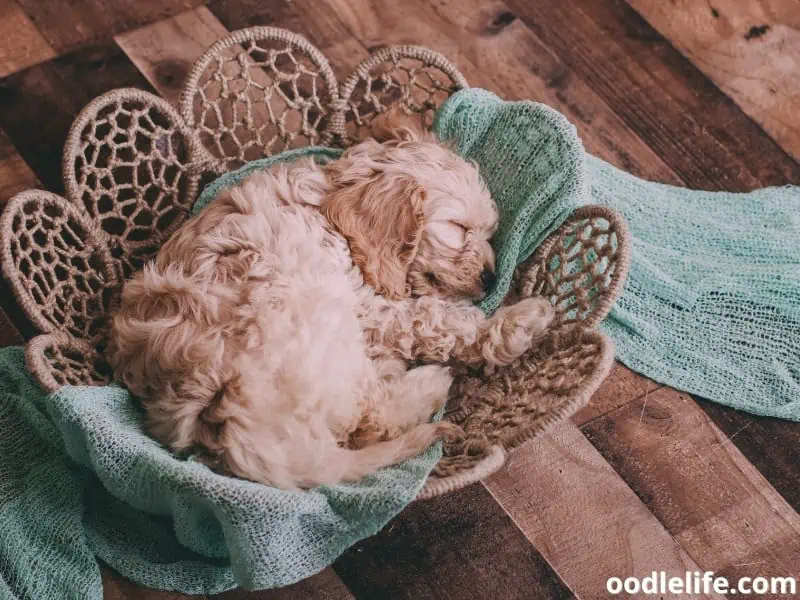
Another important sign is consistency in their nighttime routine. For instance, if your puppy has been successfully sleeping in their crate without requiring a potty break for a few nights in a row, this is a good indication that they’re ready for an uninterrupted slumber. Remember the importance of a regular bedtime routine, like scheduled playtime and feeding, which helps establish a sense of security and contentment for the puppy.
Lastly, pay attention to your puppy’s bathroom habits during the day. If they are able to hold their bladder for longer periods and have fewer accidents, this might be an indicator that they’re ready to sleep through the night without needing to go outside. However, be patient and don’t rush the process, as every puppy is different and may take longer to reach this milestone.
After all, Rome wasn’t built in a day, and neither is a puppy’s bladder control!
Preparing a Puppy for Nighttime Sleep
Establish a Routine
Teaching your puppy to sleep through the night starts with establishing a consistent bedtime routine. Activities like an evening walk, playtime, or even a special treat can signal that it’s time to wind down.

Ensure that this routine occurs around the same time each night so that your puppy knows what to expect. It won’t take long for them to associate these cues with bedtime.
Create a Comfortable Sleeping Environment
A comfortable and secure sleeping environment is essential for a good night’s sleep. Introduce your puppy to crate training, as this can help them feel safe and secure during those nighttime hours.
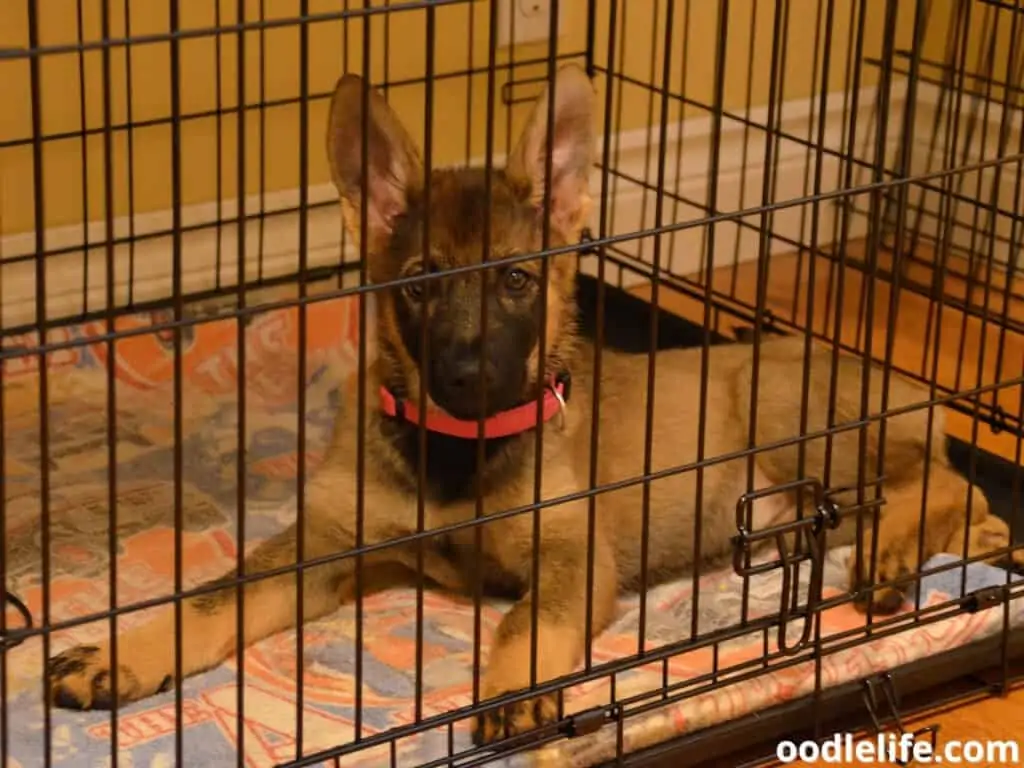
Make sure their crate or sleeping area is filled with soft, comfortable bedding and consider including a familiar-smelling item, like an old t-shirt, to provide additional comfort.
Provide a Potty Break before Bed
One key factor in helping your puppy sleep through the night without needing to pee is to offer a potty break right before bedtime. Remember, puppies can generally hold their urine for their age in months plus one, converted to hours. For example, a 3-month-old puppy can hold it for four hours.

By providing a potty break before bed, you reduce the likelihood of accidents happening during the night and help your puppy work towards eventually sleeping through the night without any interruptions.
Managing Accidents During the Night
Accidents happen, especially with puppies learning to sleep through the night without peeing. To handle these situations with grace, first, remain patient and understanding—it’s all part of the process.
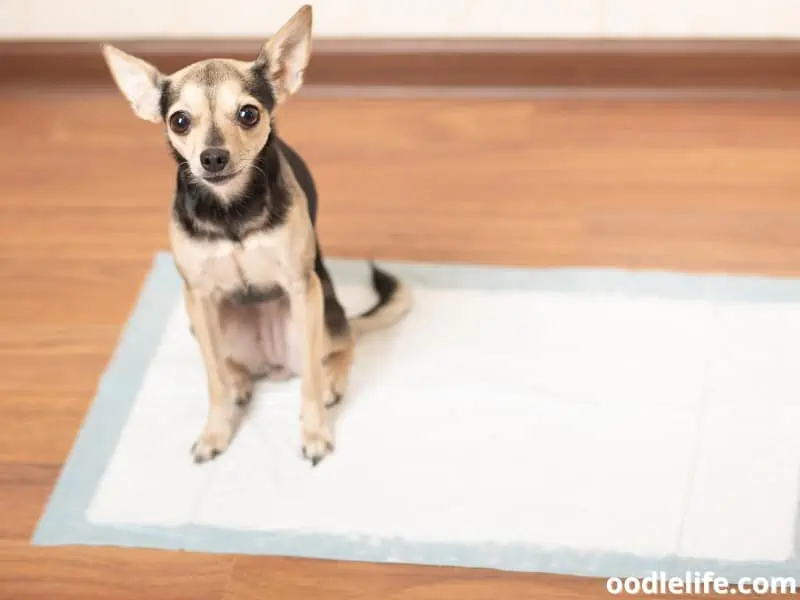
Place a waterproof mattress protector or puppy pads in your dog’s sleeping area to minimize mess and ease cleanup. Regularly check for signs of accidents and clean the area thoroughly to avoid lingering odours and prevent repeat incidents in the same spot.
Maintain a consistent nighttime routine, incrementally setting your alarm later to help your puppy gradually build bladder control. If an accident occurs, just return to the previous schedule and try again in a week or two. Don’t forget to reward your pup when they successfully hold it through the night; positive reinforcement goes a long way!
Remember, every puppy is different, and some might take longer to achieve this milestone. Laughter is key in these moments—after all, we’ve all had to navigate life’s messy learning curves. Soon enough, your pup will be snoozing soundly (and dryly) through the night.
Gradually Increasing the Time between Potty Breaks
As your puppy grows older, they will start to develop better bladder control. You may notice they can hold it in for longer periods, allowing both you and your fur baby to catch some much-needed sleep at night. Remember, patience is key during this process.
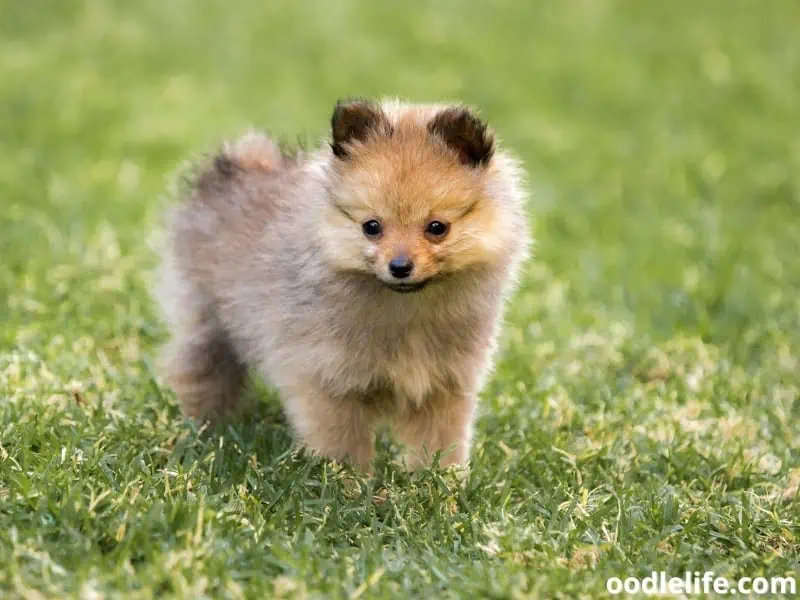
Typically, a 12-week old puppy may need 2-3 potty breaks during an 8-9 hour sleep, but as they reach 4-5 months old, this may reduce to just one break. It’s essential to monitor your puppy’s progress and adapt their potty break schedule accordingly. Just like humans, every pup is unique.
To help your puppy adapt to longer intervals between potty breaks, try implementing a consistent daily routine that includes set mealtimes, walks, playtime, and activities. By creating predictability, your puppy will learn when to expect a potty break and mentally prepare for it. A well-timed funny dance or goofy face might also help distract your pup when you’re stretching that potty break time just a bit longer—but don’t expect them to fully appreciate your humor just yet.
When to Seek Professional Advice?
As your adorable puppy grows, you may wonder when it’s time to consult a professional for their nighttime habits. Just like humans, some puppies might need extra guidance to snooze through the night without any bathroom interruptions.

If your pup is already 6-7 months old and still struggles to sleep for 8 hours without needing to pee, it could be time to seek expert advice. Keep in mind that small breed puppies might need a little longer to develop this ability, so be patient with your tiny furball.
Hold your leash, though! Before dialing up that doggy expert, ensure you’ve tried strategies like proper feeding schedules, pre-bedtime enrichment, and regular evening walks. If you’ve done all this and followed other tips from the previous sections, and your four-legged friend is still having frequent wake-up calls, it’s time to consult a professional.
In the end, it’s all about understanding your puppy’s needs and personality. Embrace the journey, cherish every moment with your furry companion, and see the bright side: countless midnight strolls under the stars. Now that’s a pawsitive outlook!